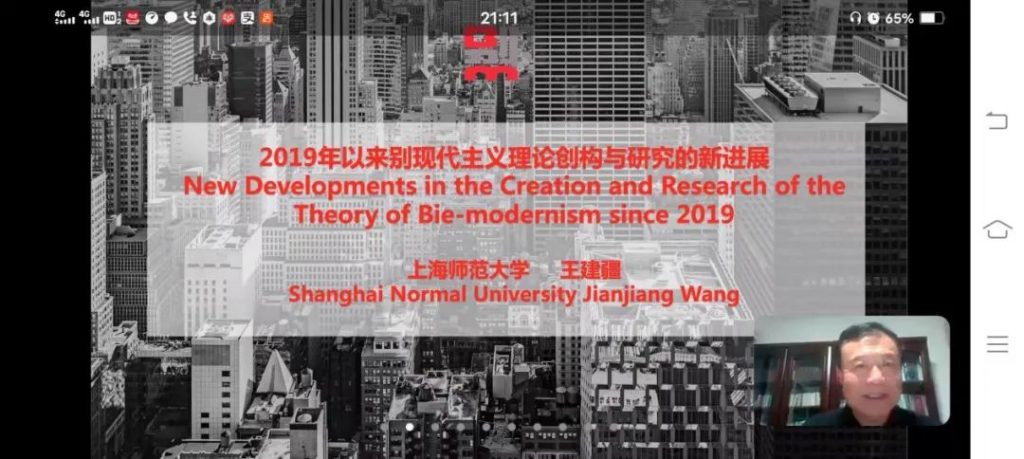The 3rd American and the 7th International Conference on Bie-Modern Academic Research is successfully held online
From 8:00 a.m. Eastern Time on November 30th to early morning Beijing time the next day, The 3rd American and the 7th International Conference on Bie-Modern Academic Research is successfully held online.It jointly organized by Center for Chinese Bie-Modern Studies (CCBMS) of Georgia Southwestern State University, the Institute of Aesthetics and Aesthetic Education, Shanghai Normal University and the Center for Bie-Modern Studies (CBMS) at Primoska University in Slovenia.
The theme of this conference is “Latest Developments in Bie-modern Theory – Dialogue on Interdisciplinary Contemporary Issues”, more than a dozen world-renowned philosophers, aestheticians and art historians from China, the United States, Italy, Ireland, Slovenia and other countries and regions, and more than 40 well-known aestheticians, literary theorists and young scholars from domestic universities such as Fudan University, Shanghai Normal University, Yangzhou University, Liaoning Normal University, and Shanxi Media Institute attended the meeting. The meeting was presided over by Keaton Wayne, Director of the Center for Chinese Bie-Modern Studies (CCBMS) at Georgia Southwest State University.
At the opening ceremony, Professor Judy Orton, Director of the Academic Department of Georgia Southwest State University, highly affirmed the contributions made by Chinese scholar and Professor Wang Jianjiang of Shanghai Normal University in the fields of aesthetics and philosophy to the world academic community. In particular, she pointed out that the proposal of the theory of Bie-modernism has created highly ideological academic topics for the world philosophy and aesthetics, and provided new ideas and perspectives for solving and explaining new problems and phenomena in today’s society.
Then, Professor Wang Jianjiang, the founder of Bie-modernism theory, introduced the new progress of Bie-modernism research since 2019 from the aspects of category innovation, method innovation, discourse innovation, research status at home and abroad, and domestic and foreign evaluations.
Professor Lu Yang, a well-known Chinese aesthetician, translator, vice president of the Chinese Society of Aesthetics, and Professor from Fudan University, delivered a speech entitled “Bie-Modernism on the Road to Interpretation and Transformation of the World”, he spoke highly of the academic achievements and world influence of Bie-modernism theory, and said that after he has already translated and introduced a large number of Western classics to Chinese scholars, he will devote himself to translating and introduced modernist theory to the world from now on.
Prof. Ernest Ženko, a world-renowned aesthetician, philosopher and Director of CBMS at Primoska University in Slovenia, compared Derrida’s postmodern theory with the theory of Bie-modernism, he delved into the issue of other Bie-modernism, and studied the effective response of Bie-modernist theory to the epistemological crisis enumerated by Jokai Roberts, Robert Farris, and Hal Roberts in “Internet Propaganda”.
British Doctor of Philosophy Professor Enea Bianchi conducted a comparative study of Western Stoicism and Baroque style with Bie-modernism, arguing that “by combining these traditions of the Western world with the theory of Bie-modernism proposed by Professor Wang Jianjiang, Only then is it possible to produce a contemporary philosophy.”
Starting from the reality of the epidemic in the United States, Kerry Wayne, a professor of political science, philosophy and religion at Southeastern Missouri State University, believes that masks are false masks for politics in medical science, the political allegory of the fake mask gives modern medicine a pseudo-modernity, not a pseudo-modernity in the usual sense, for it is not the preservation of pre-modern thought and practice in modernity, but a pseudo-modernity created in modern medical science itself.
American independent scholar Professor David Brubeck refuted Kant’s theory that “nature cannot be the foundation of moral principles” with the title of “Bie-Modern’s Leap-forward Pause: Taoist Aesthetics, Primal Nothingness, and Moral Responsibility”. He believes that Bie-modern philosophy includes experience aesthetics that are almost completely absent in modern European academia, and warns that cultures that explain the natural realm only with scientific understanding may risk imbalance.
Associate Professor Xu Dawei from China demonstrated the essence and value generation of Bie-modernism from the investigation of “ism” in Chinese and Western philosophy and art.
Dr. Guan Yu started from the rectification of the “Cynical Realism” of contemporary avant-garde art, and demonstrated the rationality of the existence of Bie-modernism art and the practical significance of the name.
The biggest highlight of this conference is that compared with previous conferences, the research on Bie-modernism in domestic and foreign academic circles has moved from basic interpretation to in-depth discussion. The 26 sub-core categories of the theory of Bie-modernism have been deeply studied by domestic and foreign academic circles. Many experts and scholars in the European and American academic circles have compared the theory of Bie-modernism with the ideological theories of the most famous philosophers and aestheticians such as Foucault, Derrida, Rancière and others. This phenomenon demonstrates the value of Bie-modernism, an original Chinese theory.
In addition, in the English speeches of this conference, “Shanghai Normal University”, “Wangjianjiang” and “Bie-mordernism” also became high-frequency words. This shows that Chinese discourse has great potential to go global, providing us with confidence and experience to enter the global ideological market and participate in international academic dialogues. We are looking forward to building a “philosophical quadrilateral” in the new pattern of “Sino-West-Marxism-I”, and looking forward to the arrival of the “philosophical moment”.

